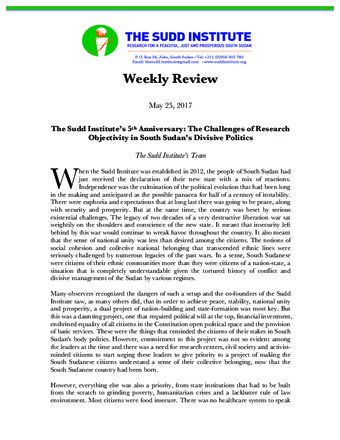The Sudd Institute’s 5th Anniversary: The Challenges of Research Objectivity in South Sudan’s Divisive Politics
Publication Summary
When the Sudd Institute was established in 2012, the people of South Sudan had just received the declaration of their new state with a mix of reactions. Independence was the culmination of the political evolution that had been long in the making and anticipated as the possible panacea for half of a century of instability. There were euphoria and expectations that at long last there was going to be peace, along with security and prosperity. But at the same time, the country was beset by serious existential challenges. The legacy of two decades of a very destructive liberation war sat weightily on the shoulders and conscience of the new state. It meant that insecurity left behind by this war would continue to wreak havoc throughout the country. It also meant that the sense of national unity was less than desired among the citizens. The notions of social cohesion and collective national belonging that transcended ethnic lines were seriously challenged by numerous legacies of the past wars. In a sense, South Sudanese were citizens of their ethnic communities more than they were citizens of a nation-state, a situation that is completely understandable given the tortured history of conflict and divisive management of the Sudan by various regimes.
Many observers recognized the dangers of such a setup and the co-founders of the Sudd Institute saw, as many others did, that in order to achieve peace, stability, national unity and prosperity, a dual project of nation-building and state-formation was most key. But this was a daunting project, one that required political will at the top, financial investment, enshrined equality of all citizens in the Constitution open political space and the provision of basic services. These were the things that reminded the citizens of their stakes in South Sudan's body politics. However, commitment to this project was not so evident among the leaders at the time and there was a need for research centers, civil society and activist-minded citizens to start urging these leaders to give priority to a project of making the South Sudanese citizens understand a sense of their collective belonging, now that the South Sudanese country had been born.

